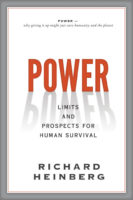 Power: Limits and Prospects for Human Survival
Power: Limits and Prospects for Human Survival
By Richard Heinberg
416 pp. New Society Publishers – Sept. 2021. $24.99.
If you know Richard Heinberg for his many previous writings on energy, you may initially assume that the title of his latest book refers to power strictly in its physics sense. But as you begin reading, it becomes apparent that he’s using a vastly broader definition of the term. For him,
“[power is] the ability to do something, the ability to get someone else to do something, or the ability to prevent someone else from doing something.”
A brilliant and searching probe into power in all its forms, this book shows how our species’ pursuit, overuse and abuse of power is plunging us ever deeper into existential crisis.
Heinberg begins his inquiry into the nature of power by tracing humanity’s present planetary dominance back to its origins. His opening chapter deals with power in nature, from the biochemical processes of individual cells to emotion, intelligence and the use of deception by animals and plants. He goes over the respective powers of physical size, muscles, neurons, warm blood, motion, perception, communication, cooperation and exclusion, among many other things. His summary of the science is engaging, accessible and filled with fascinating Heinbergian asides. (For example, he reveals that organisms have thousands of times as much power as the Sun on a gram-for-gram basis, and muses on what the evolution of eukaryotic cells—i.e., those that make up plants, animals, fungi and protists—on Earth might say about the likelihood of complex life elsewhere.)

Speaking of asides, the entire book is sprinkled with wonderfully informative sidebars. One of my favorites is titled “The Original Sins of Mainstream Economists.” It describes some of the chief blind spots of orthodox neoliberal economic theory that have led mainstream economists to absurd conclusions. For example, it explains how Nobel prize-winning economist Robert Solow’s ludicrous statement that “[t]he world can, in effect, get along without natural resources” can be traced to the failure of early economists to recognize energy and land as factors of production. This sidebar also uncovers how, despite its claims to be a legitimate science, economics is essentially “a set of moral assertions about power relations, rather than a science.”
Drawing on recent archaeological and anthropological research, the second chapter chronicles humans’ emergence as a dominant species during the Pleistocene epoch (known colloquially as the Ice Age). Heinberg identifies three major advantages that allowed Homo sapiens to outcompete all other animals and dramatically alter environments to its own advantage: toolmaking ability, language and control of fire. Of particular interest is a discussion of neurophysiologist William Calvin’s theory that changes to Earth’s climate during the Pleistocene partly drove the evolution of human intelligence. (Later on, Heinberg addresses the implications of this theory on our ability to adapt to climate changes currently being set in motion by human activity.)
The author contends that the epoch following the Pleistocene, an interglacial period known as the Holocene (which many scientists believe we’ve now managed to bring to an end through our ever-escalating human impacts, thrusting us into a new age known as the Anthropocene) was as much about the ascendancy of social power as its predecessor had been about that of physical power. From the egalitarian model of the earliest hunter-gatherer groups to the highly stratified society of late-19th-century industrialism, he outlines with admirable concision the processes by which each stage in human societal development has further amplified our ability to concentrate social power—which he defines as “the ability to get other people to do something.”
In a chapter titled “Power in the Anthropocene: The Wonderful World of Fossil Fuels,” Heinberg returns to a subject that has been the focus of numerous prior works of his. Starting with The Party’s Over in 2003, Heinberg has devoted himself to studying the profound degree to which fossil fuels have enabled us to transform both our society and the environment over the past two centuries—and the predicament in which we now find ourselves as we begin to reach limits to the rates at which these fuels can be extracted. His presentation of the topic here is condensed but thorough and up to date.
Heinberg’s assessment of our prospects for a smooth transition away from fossil fuels remains as grounded as ever:
“The end of fossil fuels—even in the best case, with forethought and proactive investment—will result in cascading disruptions to every aspect of daily existence.”
He reports that total oil production (including both conventional and unconventional sources) seems to have peaked globally in 2018. And while we don’t appear to be facing immediate constraints in supplies of our other two fossil fuels, coal and natural gas, they, too, are finite and will steadily deplete in coming decades. Meanwhile, solar and wind energy, which many consider to be our most promising replacements for fossil fuels, currently provide only a few percent of world energy.
The book cogently concludes that the human race as a whole is “overpowered.” The enormous physical power we have managed to amass by harnessing fossil fuels is overwhelming natural systems, while the immense concentration of social power enjoyed by elites is proving deleterious to the well-being of the rest of humanity. Our task as a civilization is best summarized by the title of another of Heinberg’s books: Powerdown.
“We must all,” writes Heinberg, “aim for a relatively simple life that’s attainable by everyone, and that’s able to be sustained without harming ecosystems.”
By relinquishing power in the areas of resource usage, land ownership and wealth concentration, to take just a few examples, Heinberg argues we can go a long way toward mitigating resource depletion, wildlife habitat destruction and economic inequality.
As difficult as it is to imagine a politician in a modern-day industrialized nation advocating a return to such a way of life, Heinberg insists it’s entirely within our ability to drastically shift our culture in that direction. For proof, he points to the tremendous followings that Christian, Buddhist and Muslim spiritual leaders enjoyed for many centuries despite teaching many forms of self-limitation. While not everyone responded to such appeals, Heinberg maintains they still set an important precedent. As further evidence of humans’ ability to practice power-limiting behavior, he cites the success of the abolitionist and suffrage movements. In short, he concludes that
“[t]o assume that people simply won’t voluntarily sacrifice power in order to serve the common good, even on a large scale, is simply incorrect.”
Building on the maximum power principle, which says that systems that use energy most effectively have a selective advantage over those that don’t, Heinberg proposes a new concept called the optimum power principle. The latter adds a layer of nuance to the former by stating that while systems, both natural and human, do tend to maximize their energy usage over time, they also tend to give up some degree of power in the present in order to do so. The more people who embrace the optimum power principle, reasons Heinberg quite soundly, the easier it will be to minimize human suffering and ecological damage during the challenging times ahead.
Heinberg proposes a range of possibilities for humanity’s future relationship with power. He starts with the grim “all-against-all” scenario, which sees our continued subjugation of nature and one another leading to a descent into a particularly bitter dark age. He then turns to the best case, in which we evolve toward a society of self-restraint, reining in our consumption and humanely reducing our population, through a reduction in births, to a level that can be sustained by Earth’s ecology. Along the way, he deftly dismantles the widely held wishful belief that efficiency gains and economic decoupling will save us from having to make any sacrifices. He also makes a compelling case for beauty, spirituality, inspiration and happiness as routes to true, lasting power.
Power is an excellent read for both longtime Heinberg fans and those new to his work. Like his other books, it is engrossing, original, erudite and finely written. It is with keen anticipation that one waits to see which vital, but heretofore overlooked, topic he decides to tackle in his next book.
Photo by Chris LeBoutillier on Unsplash






